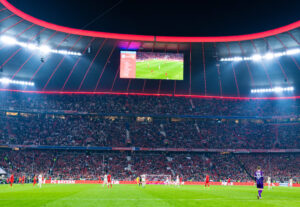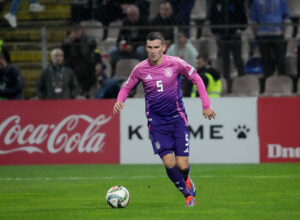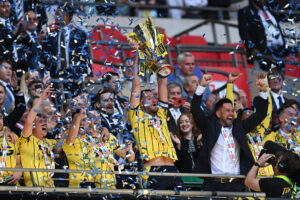Arsenal only lost 1-0 to BATE Borisov last night, so it wasn’t a St Valentine’s Day massacre, but it was a massively disappointing, indeed disturbing, defeat. It will prompt many Arsenal fans, perhaps for the first time, to ask big questions about the management of Unai Emery, or, to use his proper title, his “head coaching”.
The loss to BATE was so bad that it is arguably Arsenal’s worst ever European result. It was certainly BATE’s greatest ever European result, because it was their first ever win in any knockout match in European football, and was all the more astonishing as the Belarussian champions were playing their first football match for two months after their long winter break.
Unai Emery is Only Accelerating Arsenal’s Decline Rather Than Stopping It
The Second Leg Won’t Be Easy
Although there is still a second leg left to play, Arsenal’s failure to score an away goal means that if BATE score even one goal at the Emirates, the Gunners will need to score at least three to get through on aggregate. Given that Alexandre Lacazette, one of their two main strikers, was sent off near the end of the first leg (deservedly, for a ridiculously reckless elbow in the face of a BATE player), that task will be all the harder.
Worse still, given that the second leg will be kicking off at 5.55pm next Thursday, it is entirely likely that Arsenal will be starting their comeback effort in a half-empty Emirates Stadium, as even diehard fans will struggle to make such a ludicrous starting time. That will hardly help to generate a rousing atmosphere to stir the team to glory.
BATE Loss Not a One-Off
If the BATE defeat were simply a one-off, it would be worrying enough; it is anything but. Instead, it is just the latest in an increasingly long line of poor results and worse performances. Since the end of Arsenal’s 22-match unbeaten run in all competitions against Southampton in mid-December, the Gunners have now lost exactly half of their last 14 games, including three of their last four away games (the exception being a narrow win against Huddersfield Town, the bottom team in the Premier League).
Autumn a False Dawn
It is now apparent that that long unbeaten run in the autumn, which began with 11 wins in a row, was the falsest of dawns. Even during it, there were continuing doubts about a defence that seemed intent on conceding a succession of opportunities against even the poorest of opponents (both in the Premier League and the Europa League). The truth is that the quality of the opposition that Arsenal faced during that period was largely poor.
The only genuinely noteworthy results were a home draw against Liverpool, secured with a late equaliser after the Reds had had an early goal wrongly ruled out for offside, and a home defeat of a Tottenham Hotspur side that were clearly exhausted after their Champions League efforts against Inter a few days earlier (when Arsenal’s reserves had been playing in the Europa League against Qarabag) and consequently tailed off badly in the second half.
Defenders, Not Wingers, Were Needed In January
However, the most damning indictment of Emery is what he did, or rather failed to do, or, to be even more precise, did not even try to do, during the January transfer window. It is undoubtedly true that Arsenal’s defensive problems are long-standing and predate Emery’s arrival at the club, and that they were further compounded by the season-ending injuries suffered by the team’s two best young defenders, Rob Holding and Hector Bellerin.
Nevertheless, Emery’s obsession with signing wingers, culminating in his loan acquisition of Denis Suarez, rather than centre or full-backs, looked bizarre at the time and now, when the transfer window is shut until the summer, appears utterly indefensible.
Decline Not Recent, But Long-term
Of course, Arsenal’s recent decline under Emery must be placed against the far bigger picture of the long-term decline of the club under Arsene Wenger, which began at least a decade ago and arguably as far back as the club’s move to The Emirates in 2006. However, that long-term decline, during which Arsenal went from being serial Premier League winners and genuine Champions League contenders to becoming Premier League also-rans and Europa League competitors, only intensified the need for Emery to try and hit the ground running and immediately attempt to arrest the club’s slide.
Instead, after a brief and illusory period of relative success in the autumn, Emery increasingly appears powerless to do anything substantial to turn Arsenal back into a serious trophy-winning (or at least trophy-contending) side again. Indeed, as is undeniably the case with the defence, in some respects he is actually making things worse.
Emery Not Alone In His Failings
Emery is not alone in his dereliction of duty. In that regard, the worst offender by far is Arsenal’s owner, Stan Kroenke, who is an utterly absentee owner, both physically, given that he is rarely seen at the club, and spiritually, given that it is now completely obvious that his real sporting interest (in as far as he has any sporting interest at all other than a desire to make money from sport) is in his American Football team, the LA Rams.
That absenteeism at the top has been compounded by the almost immediate collapse of the so-called ‘management structure’ that had been put in place supposedly to replace Arsene Wenger when he left the club. Ivan Gazidis, who put that structure in place (with himself at the head of it) has already gone to AC Milan (he must have known what was coming after Wenger left); Sven Mislintat, the scouting genius procured from Dortmund to great fanfare, has also quit; and Raul Sanllehi is the last man standing. Well, Sanllehi may have come from Barcelona, but it is now clear that he is a marketing man who had little or nothing to do with the Catalans’ sporting success over the last decade. Those who were responsible for that are either still at Barcelona or at Manchester City.
Emery Still At Fault
Nevertheless, Emery must take his fair share of the blame for Arsenal’s failings, especially those that have intensified during his time at the club. It was a personal conviction that he was not sufficiently qualified to take on the Arsenal job, given that the two prerequisites for Wenger’s successor (if there was to be any truth in the club’s claims that they wanted to begin competing again for the top prizes) were that he should have won one of the five big European leagues and done well in the Champions League.
It is true that Emery did win the French League with Paris Saint-Germain, but only in one of his two seasons there, which, given PSG’s utter financial dominance in France, was astonishing. And his only real experience in the Champions League was to qualify for it by winning the Europa League with Sevilla, before crashing back into the Europa League when Sevilla failed to progress beyond the group stage. His much-vaunted ‘hat-trick’ of Europa League wins is, in reality, the hollowest of European achievements and now, as he proved against BATE last night, the ‘Europa League specialist’ cannot even win in the Europa League.
Emery Accelerating Decline, Not Stopping It
Emery is certainly not responsible for the decade-long decline that Arsenal have already endured, but he was brought in to arrest that decline, not accelerate it. At the moment, while he is in charge on the pitch, and Sanllehi and Kroenke are in charge in the boardroom, Arsenal’s decade-long decline seems certain to extend into a second decade, and beyond.
Main Photo






